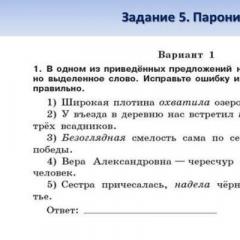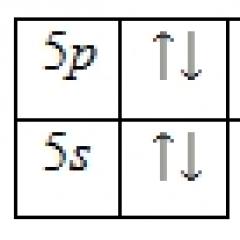The best presentation on the works of Al Barto. Presentation "Agniya Barto" on literature - project, report. It's like she's not seven, not eight
To view the presentation with pictures, design and slides, download its file and open it in PowerPoint on your computer.
Text content of presentation slides: Performed by a primary school teacher, Boksitogorsk Secondary School No. 3 Tikhomirova Elena Aleksandrovna Agniya Lvovna Barto was born in Moscow on February 17, 1906. There she studied and grew up. Her father, Lev Nikolaevich Volov, was a veterinarian, and they always had many different animals in the house. Favorite writer was A. N. Tolstoy. And as A. Barto recalls, her father taught her to read from his books. He also loved and knew by heart all the fables of I. A. Krylov. Everyone has a dream in childhood. Agnia dreamed of becoming an organ grinder: walking around the yards, turning the handle of the organ grinder. So that people, attracted by the music, would lean out of all the windows. She began writing poetry in early childhood - in the first grades of the gymnasium. And she wrote, as befits poets, mainly about love: about gentlemen and “pink marquises.” The poetess's main critic was, of course, her father. Agnia Lvovna was advised to take literature seriously by Anatoly Vasilyevich Lunacharsky, People's Commissar (Minister) of Culture. Listening to her first poem, he realized that Agniya Lvovna would definitely write - and write funny poems. Agnia Lvovna often visited schools and kindergartens, listened to the conversations of children on the streets and in courtyards. Once she heard the words of a little girl who was watching the house being moved near the Stone Bridge: “Mom, can you now drive straight into the forest in this house?” This is how the poem “The House Moved” appeared. In 1936, the cycle of poems “Toys” appeared. During the Great Patriotic War, Agnia Lvovna lived in Sverdlovsk, published war poems and articles. As a correspondent for Komsomolskaya Pravda, she visited the Western Front in 1942. But she always wanted to write about young heroes: especially about teenagers who worked in factories, replacing their fathers who went to the front. On the advice of Pavel Bazhov, the poetess went to the factory as an apprentice and acquired the specialty of a 2nd category turner. This is how the poem “My Student” was written, in which she talks about this with humor. At the very end of the war, before Victory Day, a great misfortune occurred in the family of A.L. Barto - her son Garik died. The poems left the house. Agnia Lvovna began visiting orphanages where orphans lived - victims of the war. There she again became convinced of how much children care about poetry. She read her poems to them and saw how the children began to smile. This is how a new book of poems “Zvenigorod” (1947) appeared - a book about children from orphanages and about the people who care for them. When Agnia Barto's daughter Tatyana had a son, Volodya, he became Agnia Lvovna's most desired and beloved grandson. It was about him that the poetess created a whole cycle of poems: “Vovka is a kind soul.” Agnia Lvovna Barto also wrote scripts for children’s films “The Elephant and the Rope” and “The Foundling.” Everyone loves to watch these films: both adults and children. A. Barto died on April 1, 1981. After her, she left behind one and a half million books in 86 languages, wonderful poems that we remember from childhood and will read to our children.
Attached files
- “Vovka is a kind soul.” "School". What Seryozha repeated in the poem “Seryozha teaches lessons.” They dropped the bear on the floor and tore off the bear's paw. What was the name of the boy who took his notebook. "Lyalechka." Guess the riddle. "Sonechka." Lyubochka. 3 questions for a thinking reader. "Comic." There is a house: whoever enters it will acquire intelligence. Agnia Lvovna Barto (1906-1981). Give a reason. "Zvenigorod". A journey to the land of cheerful childhood.
“Brief biography of Barto” - Russia is proud of them. Art films. Host of the radio program “Find a Person”. Barto was evacuated in Sverdlovsk. The language of childhood. Writing poetry for children. Real name Volov. Critics have always been kind to her. The works were published in huge editions. Agnia Barto was always on time and everywhere. 150 books for children. 1950 - state prize. A.L. died Barto in Moscow on April 1, 1981.
“Biography of Barto” - Zvenigorod. The turtle has lost weight. One day I broke glass. Elephant. Agnia Lvovna Barto. Flags on the balcony. Invitation to the People's Commissariat of Education. Famous children's writer. People's Commissar of Education Lunacharsky. Poetry of kindness. Creation. Water. The writer died on April 1, 1981. Agnia diligently practiced dancing. Barto headed the Association of Literary Workers. Poems on the themes of peace, brotherhood and defense of our Motherland.
“Quiz on Barto’s poems” - Quiz on the poems of Agnia Barto. Whose words are these? What was this boy's name? What does the fish do when the song starts? What did the guys come up with to keep the snow woman from getting bored? Truck. Who sang like that? What poem are these lines from? Who said so? Name the cycle of poems. Who was named Dunya. Name the girl. What can he bake? Who, who lives in this room. Who is this. Who said this? Bright pink breast, two shiny wings.
“Poems of Agnia Barto for children” - I’m reading a book. Finish the line. The Urals fight great. Muscovite. Attempt at writing. Chinese. Lullaby. Fresh breeze. Elephant and rope. Ballet. It took us more than an hour to assemble Taras from pieces. Notes of a children's poet. Agnia Lvovna. Adults. Agniya Barto. Words. Powerful movie. Radio "Mayak". Howler girl. Poetry. Secrets of a children's poet. Soccer ball. Fragment of the film "Foundling". Find a person. Winter forest.
“Barto Quiz” - Lines. The elephant nods its head. What are the boy captain's frogs asking for? A boy riding a horse. I couldn't get off the bench. We'll build the plane ourselves. Frogs. I love my horse. Tanya. Toys. Continue the poem. Tanechka. Barto. The owner abandoned the bunny. Cries loudly. Film-strip. What happened to the cat. What does an elephant do? Airplane. Let's fly over the forests. Lines from a poem. The sleepy bear lay down in bed.
Slide 2
Agnia Lvovna Barto (1906 - 1981)
Slide 3
Occupation:
poetess; writer; screenwriter. Awards: Stalin Prize of the second degree (1950), Lenin Prize (1972), Leo Tolstoy medal “For merits in creating works for children and youth.”
Slide 4
Agnia Lvovna was born in February 1906 in Moscow into the family of a veterinarian who instilled in her a love of the classics. Agnia began writing poetry early, in high school, then in a rural school. She dreamed of becoming a dancer and entered a choreographic school, but she never stopped writing poetry. The first and very strict connoisseur of these poems was my father. He strictly monitored his daughter and taught her how to write “correctly.” When Agnia Barto first brought her poems to the publishing house, she was only 19 years old. This was in 1925.
Slide 5
The hardest page in her biography was the war.
She was able to see fascism for the first time. The German army bombed hospitals, schools, and shelters. Agnia Lvovna spoke a lot on the radio to soldiers at the front. She was a correspondent for Komsomolskaya Pravda and often spoke at factories. There she saw the work of teenage workers, which amazed her. This difficult time was reflected in her poetry. This is how the poems appeared: “I decided to become a student,” “Newcomer,” “Fidget,” “My student,” etc. But still, her poems are humorous, cheerful, kind and consonant.
Slide 6
Every child from childhood became acquainted with the work of A.L. Barto. These are poems from the collection “Toys”.
Slide 7
Slide 8
Teddy Bear They dropped the bear on the floor, They tore off the bear’s paw. I still won’t leave him, Because he’s good.
Slide 9
Elephant
Time to sleep. The bull fell asleep and lay down on his side in the box. The sleepy bear went to bed, but the elephant doesn’t want to sleep. The elephant nods its head and bows to the elephant.
Slide 10
horse
I love my horse, I comb its fur smoothly. I’ll smooth my tail with a comb, and go on horseback to visit.
Slide 11
Most of Agnia Barto's poems are written for children - preschoolers or primary schoolchildren.
Slide 12
Feature films based on the scripts of Agnia Barto became widely known: “The Foundling” 1939, “The Elephant and the Rope” 1946, “Alyosha Ptitsyn Develops Character” 1953, “Ten Thousand Boys” 1963, “Black Kitten” » 1965
Slide 13
Many of A. Barto’s poems became songs:
“Amateur Fisherman” “Song about Petya” “Lyoshenka, Lyoshenka” “Polite Waltz” “What the Birds Sang About” “Chatterbox”, etc.
Slide 14
Determine the names of the heroes.
“We go as a couple with...” “I don’t have time to chat...” “Blue skirt, ribbon in the braid...” “He has one question: - Will Santa Claus be giving out gifts soon?” "Kind soul..."
Slide 15
Many lines from A. Barto's poems sound like proverbs or sayings. Remember what poems they are from:
“When should I chat? I don’t have time to chat.” “There are such people - Serve them everything on a platter!” “Following fashion, don’t disfigure yourself!” “It’s very bad to live in the world, If you see everything wrong.” “One squad plants a garden, another breaks it down.”
Slide 16
Who owns these things?
Skirt and ribbon Half a cookie, a penny, a nickel A bouquet and a piece of paper with the words “Congratulations... I wish...” A number and a theater ticket A fishing rod A diary with a deuce
Slide 17
Answer the questions
What is the name of the boy, the hero of the poem “The Letter R”? What did the girl lose in the theater (poem “In the Theater”) What does Masha dream about in the poem “First-Grader”? Who did Natasha feel sorry for in the poem “Not Alone”? What was the name of the rubber doll that the characters in the poem washed with gasoline? What was the roaring girl's name? He is a boy of about 8 years old, his grandmother bought him a scarecrow, but did not give it to him. The hero of the poem “Mom or Me?” The girl who “touches her by accident, immediately “Guard!” What is the name of the boy who helped out the grandmothers, became an older brother, his turtle lost weight, and he shook the tricks out of Andryushka?
View all slides
Slide 1
Agniya Barto
laughter that heals

Slide 2
Biography
in the family of a veterinarian
She studied at the gymnasium, where she began writing poetry
Studied at a choreographic school

Slide 3
If we maintain historical accuracy, the daughter in the family of Lev and Maria Volov was born not one hundred years ago, as encyclopedias claim, but ninety-nine years ago - on February 17, 1907. Agnia Lvovna herself had a hand in this mistake. As a fifteen-year-old girl, she added an extra year to herself to go to work at the Clothes store - she was hungry, and the workers received herring heads from which they made soup. Later, she - tall, graceful, elusively similar to the young Akhmatova - graduated from a choreographic school and managed to work in one of the Moscow theaters.

Slide 4
Anatoly Vasilyevich Lunacharsky advised me to take up literary work seriously. He came to the final exams at the choreographic school, where I graduated, planning to become a ballerina. After the tests, students spoke. To the music of Chopin, I read my very long poem “Funeral March”, taking the appropriate tragic poses. When they told me that during my speech Lunacharsky had difficulty hiding his smile, I was very offended. A few days later, Anatoly Vasilyevich invited me to the People's Commissariat for Education and said that, listening to my “Funeral March,” he realized that I would definitely write... funny poetry. He spoke to me for a long time and cordially, and he himself wrote on a piece of paper what books I should read. This is one of the great impressions of my youth.

Slide 5
At the beginning of my work, I had a lot of helpless poems, and I am sincerely grateful to S. Marshak and K. Chukovsky, who treated my early works with a strict, demanding attitude and criticized me directly, without any “streamlinedness.” I remember how one day Samuil Yakovlevich Marshak, angrily criticizing my poem, said, obviously feeling that I needed to be encouraged: “Work! Not everyone succeeded right away! Even Antosha Chekhonte did not immediately become Chekhov!”
But how pleased I was with the praise of my senior comrades. In 1933, K.I. Chukovsky wrote several kind words about my “Toys” in “Evening Moscow”. Then it was rare - a review of children's poems in the central press.

Slide 6
During the Great Patriotic War, I spoke a lot on the radio in Moscow and Sverdlovsk. She published war poems, articles, and essays in newspapers. In 1942, she was on the Western Front as a correspondent for Komsomolskaya Pravda.
In the post-war years, I wrote several short poems for children, including a poem about orphans “Zvenigorod”. I still love her, although I usually cool off on my things pretty quickly. Maybe she is especially dear to me because she really “interfered in life,” in the fate of two people. A woman who lost her daughter during the war (she had been looking for the girl for eight years) wrote to me that she had read “Zvenigorod,” which tells how much care the children are surrounded by in our orphanages, and now her heart hurts less. With this letter, I contacted the department for searching for missing children, and the search began again. Two years later, the daughter was found and met with her mother.
Agnia Barto hosted the radio program “Find a Person.” The grown up children who were searched for and who themselves were looking for loved ones, often did not know their real names, nor the names of their parents, nor even the place where they lived before the war. All they had were fragments of childhood memories: the girl remembered that she lived with her parents near the forest and her dad’s name was Grisha; the boy remembered how he and his brother rode on the “gate with music”... The dog Julbars, his father’s blue tunic and a bag of apples, like a rooster pecked between his eyebrows - that’s all that the military children knew about their former life. This was not enough for official searches, but for Barto it was enough.



